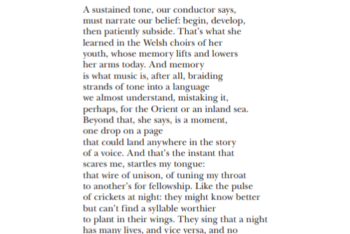Articles/Essays – Volume 46, No. 2
Singing in the Easter Choir beside My Enemy
A sustained tone, our conductor says,
must narrate our belief: begin, develop,
then patiently subside. That’s what she
learned in the Welsh choirs of her
youth, whose memory lifts and lowers
her arms today. And memory
is what music is, after all, braiding
strands of tone into a language
we almost understand, mistaking it,
perhaps, for the Orient or an inland sea.
Beyond that, she says, is a moment,
one drop on a page
that could land anywhere in the story
of a voice. And that’s the instant that
scares me, startles my tongue:
that wire of unison, of tuning my throat
to another’s for fellowship. Like the pulse
of crickets at night: they might know better
but can’t find a syllable worthier
to plant in their wings. They sing that a night
has many lives, and vice versa, and no
one voice will do for all of them.
Outside the chapel, the aspens rise up,
shaking their best music from the branches.
Inside, I and the man beside me tune our voices
into the cadence, which ends in silence,
which is the sound of forgetting,
the sound of grief cancelled.


 Back to full Issue
Back to full Issue

